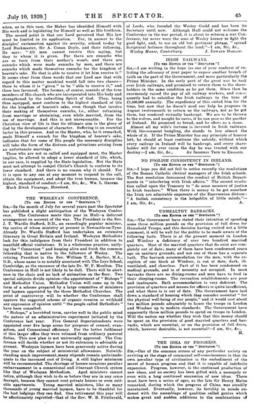THE WESLEYAN CONFERENCE.
[To THE EDITOR OF THE " SPECTATOR.") SIR,—In the month of July for several years past the Spectator has published a slight anticipation of the Wesleyan Confer- ence. The Conference meets this year in Hull—a deferred arrangement on account of the war. The President is the Rev. J. T. Wardle Stafford, D.D., an exceedingly popular minister, the centre of whose ministry at present is Newcastle-on-Tyno. Already Dr. Wardle Stafford has undertaken an extensive itinerary in Great Britain and Ireland. Wesleyan Methodists look for this indulgence from their President in addition to manifold official visitations. It is a wholesome practice, unify- ing the " Connexion " and keeping alive and fresh the common fellowship that is native to the followers of Wesley. The retiring President is the Rev. William T. A. Barber, M.A., D.D., whose name is so notably associated with The Leys School, Cambridge, as the successor of the late Dr. W. F. Moulton. The Conference in Hull is not likely to be dull. There will be alert- ness in the chair and no lack of animation on the floor. Two special subjects divide opinion—the appointment of " Bishops " and Methodist Union. Methodist Union will come up in the form of a scheme prepared by a large committee of ministers and laymen appointed by the three Methodist Churches. The point of controversy . will be whether the Conference shall approve the suggested scheme of organic reunion or withhold any expression of opinion until "the people called Methodists' have been consulted.
"Bishops," a borrifased term, carries well to the public mind the nature of an administrative experiment initiated by the
Conference last 'Year. Five General Superintendents were appointed over five large areas for purposes of counsel, evan- gelism, and Connexional efficiency. For the better fulfilment of this larger office they were released from ordinary pastoral duties. This new plan is not universally approved. The Con- ference will decide whether or not its extension is advisable at Present. Wesleyan laymen have been generously active during the year on the subject of ministerial allowances. Notwith- standing much improvement, many stipends remain quite inade- quate to the increased cost of living. A still higher minimum will be recommended. The shortage of houses occasions peculiar embarrassment in a connexional and itinerant Church system like that of Wesleyan Methodism. Aged, ministers cannot retire, although they wish to do so before they are in any sense decrepit, because they cannot rent private houses or even suit- able apartments. Young married ministers, like so many thousands of young married laymen, have to be thankful for the bast lodgings they can find. One retirement this year will be affectionately regretted—that of the Rev. W. B. FitzGerald,
of Leeds, who founded the Wesley Guild and has been its Secretary until now. Although Hull could not welcome the Conference in the war period, it is about to witness a war Con- ference, for never were the sons of Wesley keener to fight the good fight, and, to use an old but pertinent phrase, "spread Scriptural holiness throughout the land."—I am, Sir, &e.,


































 Previous page
Previous page